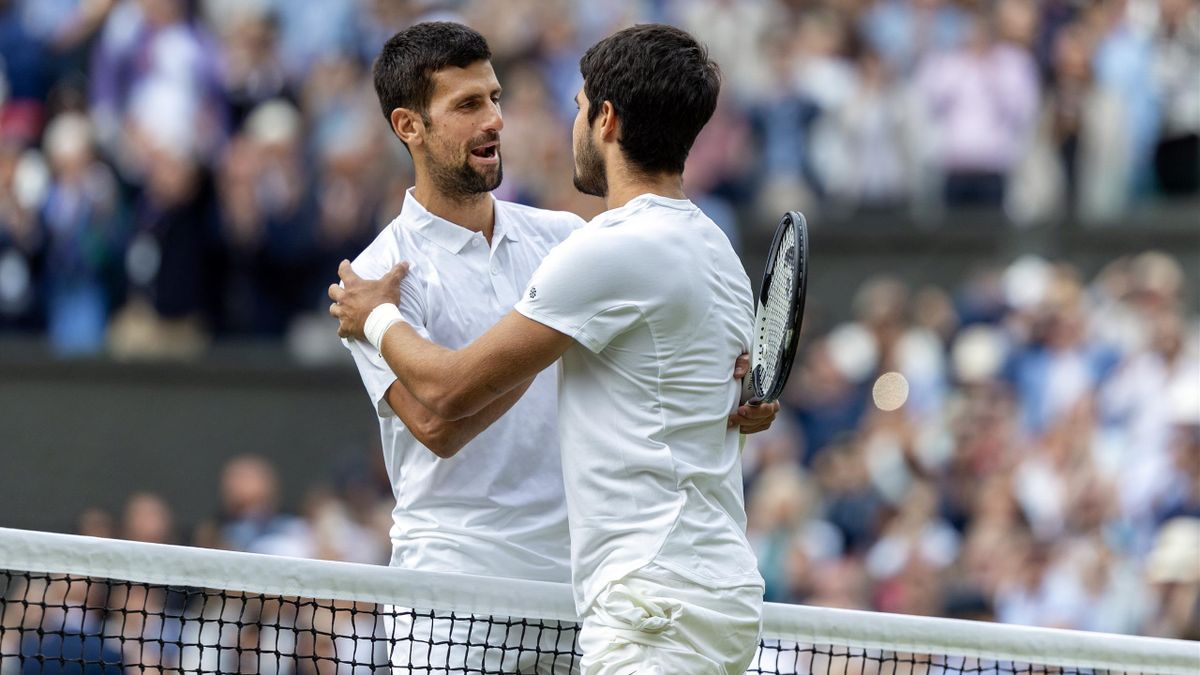‘If we weren’t surprised, we wouldn’t be human’ – Carlos Alcaraz’s fitness coach on adapting to grass for Wimbledon win
Carlos Alcaraz’s stunning success on grass this season took his own team by surprise, the Spaniard’s fitness coach has admitted following his Wimbledon triumph.
Physio and rehab specialist Juanjo Moreno was part of the team responsible for getting the world No. 1 into top shape for his tilt at a second Grand Slam title.
He delivered in style, warming up for Wimbledon by taking the Queen’s title in just his third career grass-court event, before stunning Novak Djokovic in a thrilling five-set final to claim the All England Club crown too.
Alcaraz not only toppled a record 23-time men’s singles Grand Slam winner in the final, but did so with very little experience playing on grass before this year.
“If we weren’t surprised, we wouldn’t be human,” Moreno told ATPTour.com.
“As Alcaraz’s team, captained by Juan Carlos Ferrero, our targets and goals couldn’t be bigger. When we prepare Carlos for any competition it is for him to win.
“As a team there is no other goal in our head that is not winning the tournament we are entering.
“Also avoiding injuries, if possible, which is the biggest concern for the technical staff, being aware that achieving sporting results or performances can often come at the cost of caring for the body. But that’s high-performance sport and we accept the challenge.
“To us it’s surprising from a certain point of view, but from another the result achieved by Carlos was also to be expected.
“We prepare to win every competition we enter, therefore we try to choose carefully which ones we go to.
“If we managed to win Queen’s and Wimbledon with such a short period of adaptation to the surface, of course it’s surprising.
“Surprising from the point of view of a huge historic achievement, but not because we weren’t expecting it. Really, we were expecting to win it and that’s what we work for every day.”
‘Two incredible players’ – Robson hails Alcaraz and Djokovic after ‘incredible’ final
It was the second major title triumph of Alcaraz’s young career, following his success at the 2022 US Open.
His bid for Roland-Garros glory this year came undone at the semi-final stage against Djokovic, when the 20-year-old started struggling with cramp during the match.
But Moreno believes Alcaraz showed at Wimbledon that he has learned how to get on top of such problems by addressing his mentality.
“Carlos is a sportsman who learns very quickly from what has happened,” Moreno explained.
“When the match finished he also asked questions about why it [the cramping] happened and we talked about it as a team.
“He is told what the reason is, he understands perfectly and learns from the experience.
“With this information and with the work he does with his psychologist Isabel Balaguer, also a member of his team, Carlos has been able to learn and overcome the situation.”
Lo and behold, when it came to the Wimbledon final, which lasted almost five hours and went the distance in a gruelling five-set contest, Alcaraz was ready.

Novak Djokovic (l.) and Carlos Alcaraz
Image credit: Getty Images
“We knew that it was a match with similar pressure to the one at Roland-Garros, or greater, because it was the final at Wimbledon,” said Moreno.
“We were aware that the match would be difficult, that Djokovic wasn’t going to make things easy. As the match progressed, as one of the main people responsible for that area, I was getting a little nervous thinking that the cramps might come back.
“But I also trusted in Carlos’ capacity to learn. I was also calm, in part. I knew that my work was done, that Carlos had taken the same [physical and nutritional preparations] as he took at Roland-Garros, and I was confident things would go well. If he had learned from what happened in Paris, as he demonstrated, those cramps wouldn’t happen.”
“At Roland-Garros those cramps came around two hours into the match. At Wimbledon he played for almost five hours and the cramps didn’t appear. That shows that Carlos is an athlete who learns very quickly from his experiences.”
Moreno was unable to offer any guarantees, however, that Alcaraz will enjoy the same longevity and durability that Djokovic – now aged 36 – has shown in his decorated career.
“In terms of longevity, it’s very complicated,” he said.
“Tennis is a very physically demanding discipline; it’s unusual for a tennis player not to go through injuries. There’s little time to adapt, the calendar is demanding and you never know in terms of planning how long a match will last.
“I can do calculations but it’s impossible to know until the match is over. At a Grand Slam you can play everything in less than three hours, but then you can actually end up playing for over five hours.”
He added: “In athletics, probably, the track will always be the same over the next decade. But in tennis over the next 10 years the surface will require us to compete on grass, clay and hard courts every season.
“There will be ball changes, different atmospheric and meteorological conditions. The range of factors is too wide to make a prediction like that of Djokovic.
“I would love for all the work we do with Carlos to give us a sportsman with a long career. We’re working hard to take care of his body and prolong his sporting life as long as possible.”
Read the full article Here


